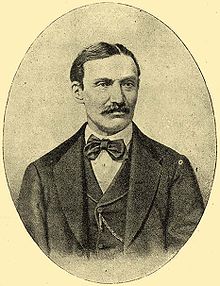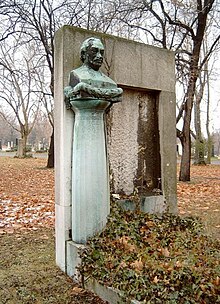Maximilian Falk
Maximilian (Miksa) Falk (born October 7, 1828 in Pest , Kingdom of Hungary / Austrian Empire ; † September 10, 1908 in Budapest , Austria-Hungary ) was a Hungarian publicist and politician .
Life
Falk, who came from a Hungarian-Jewish merchant family, studied philosophy and law at the University of Budapest and the University of Vienna . Until 1867 he stayed mainly in Vienna. He began his journalistic activities in 1844. He worked, among other things, for Spiegel (which is not identical to today's magazine) and for the newspapers Der Ungar and Életképek . He took part in the revolution of 1848/49 . He fought against absolutism in the Pesti Napló and Wanderer newspapers .
His work earned him the trust of István Széchenyi and Ferenc Deák .
Professionally, he was editor-in-chief of Pester Lloyd from 1868 to 1906 and made the German-language newspaper one of the leading in Hungary. Politically, he was a member of the Hungarian House of Representatives and the Imperial Council as a member of the Liberal Party from 1869 .
Falk got to know the Hungarian Queen Elisabeth and gave lectures on Hungarian literature for her. He recorded his encounters with the Queen in written memoirs, which were published in book form in Budapest in 1898 under the title Erzsébet királynéról -visszaemlékezések ( Eng . "About Queen Elisabeth - Memories"). He knew how to mediate between the Austro-Hungarian court and the Hungarian politicians. Falk was also president of the Hungarian Journalists' Association.
In 1883 he founded the Lipótváros Casino , which is now the Hotel Donau Palast in Budapest. He was also its first director. He was also an advisor to the Hungarian Prime Minister Sándor Wekerle during the currency reform in Hungary after 1883.
Trivia
In 2014, a memorial was erected in the street named after him in Budapest ( Falk Miksa utca ) by the US actor Peter Falk and his dog.
literature
- Falk, Maximilian. In: Austrian Biographical Lexicon 1815–1950 (ÖBL). Volume 1, Verlag der Österreichischen Akademie der Wissenschaften, Vienna 1957, p. 284.
Individual evidence
- ^ The history of Pester Lloyd between 1854–1875. I. Section 197, accessed on January 27, 2010.
- ^ The German-language press of Hungary in the years 1848/49 (PDF; 199 kB) in Ihr Männer, now the time of Mária Roszá, accessed on January 27, 2010.
- ↑ The Centropa Interview on CENTROPA.ORG from September 2007, accessed on January 27, 2010 (English)
- ↑ Gábor Ujváry: Hungarian On the trail history in Vienna. in Collegium Hungaricum accessed on January 27, 2010. ( collegium-hungaricum.at ( Memento from July 6, 2011 in the Internet Archive ))
- ↑ A Hungarian new edition of the book was published in 2016 in the series "Szepmives" in Budapest's Athenaeum Kiadó (publisher). ISBN 978-615566210-2 .
- ↑ Budapest Hotels ( Memento of May 4, 2009 in the Internet Archive ) accessed on January 27, 2010.
- ↑ Géza Andreas von Geyr: Sándor Wekerle, 1848–1921: the political biography of a Hungarian ... accessed on January 27, 2010. (books.google.at)
- ↑ Euronews
Web links
- For king, people and / or fatherland? ( Memento of July 24, 2011 in the Internet Archive ) on Pester Lloyd
| personal data | |
|---|---|
| SURNAME | Falk, Maximilian |
| ALTERNATIVE NAMES | Falk Miksa |
| BRIEF DESCRIPTION | Hungarian publicist and politician |
| DATE OF BIRTH | October 7, 1828 |
| PLACE OF BIRTH | Pest , Hungary |
| DATE OF DEATH | September 10, 1908 |
| Place of death | Budapest |

